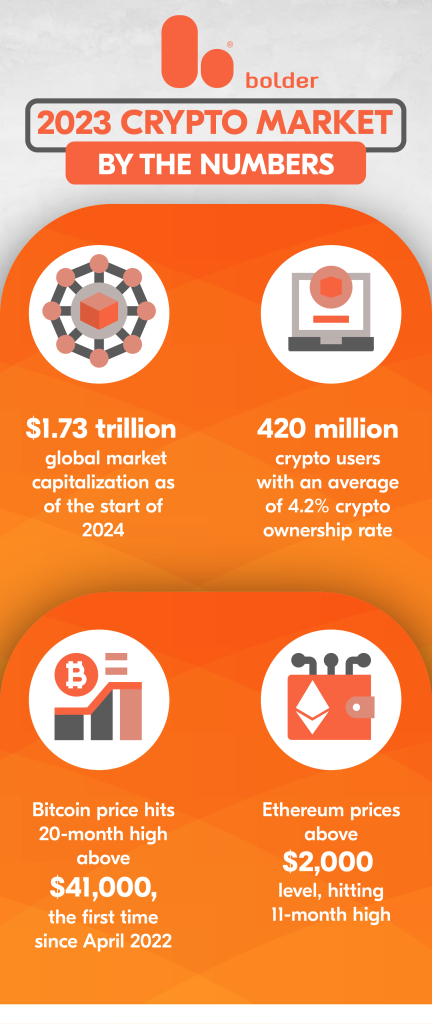Crypto Market Outlook in 2024
DISCLAIMER: This post was last modified on 08 January 2024. Some information in this article may not be updated.
Following the significant events that led to the crypto winter in 2022, 2023 also had its fair share of highs and lows – mainly seeing an approaching normalisation (some might even say, the mainstream acceptance) of crypto, as well as regulatory crackdowns and developments in the digital assets market.
We look back to some notable events that shaped the crypto space last 2023 and look into what asset managers, investors and other crypto market participants should expect in 2024.
Crypto 2023 – A Year in Review

Recent figures show that the crypto market has come a long way from the slump in 2022 (which can be denoted by a US$1.46 trillion drop in market cap). Safe to say, the market has since warmed up from the preceding crypto winter. However, numerous challenges, primarily regulatory scrutiny, continued to play a significant role in shaping the future of the crypto sector.
To recap, below are just some of the noteworthy events in the crypto world in 2023.
The fall of crypto-friendly banks.
Silvergate and Signature Bank, two of the most prominent banks for crypto companies, were shut down in less than a week by US regulators – raising fears in the already tense market following the collapse of Silicon Valley Bank in the same month and cryptocurrency exchange FTX last November 2022.
Introduction of new crypto-focused regulation in the EU.
The EU parliament formally adopted the Markets in Crypto Assets (“MiCA”) regulation, signaling a stricter and more comprehensive regulatory approach to the operations of crypto assets in the EU.
Charges against the largest crypto exchange.
The US SEC filed 13 charges against Binance, the largest crypto exchange by market cap, as well as its CEO and founder Changpeng Zhao (more commonly known as “CZ”). The commission alleged that Binance operated as an unregistered securities exchange and mishandled investor funds. In the same month, the SEC also filed similar charges against Coinbase for allegedly violating securities laws.
Grayscale’s court win against the SEC.
Asset management firm Grayscale won a court ruling against the US SEC, overturning the SEC’s rejection of Grayscale’s application to convert its main investment vehicle, Grayscale Bitcoin Trust (“GBTC”), into a spot bitcoin exchange-traded fund (“ETF”). The ruling prompted the SEC to re-consider Grayscale’s application, joining other spot bitcoin ETF applications from BlackRock, ARK Investments, 21Shares and Fidelity, among other firms. The court decision signaled a positive turn for the approval of Bitcoin ETF applications in the near future.
Read more updates about the spot Bitcoin ETF applications below.
FTX founder convicted of fraud and money laundering.
After being charged with seven counts of fraud and money laundering in late 2022, FTX and Alameda founder Sam Bankman-Fried was found guilty on all counts. Binance then settled a fine of US$4.3 billion (forfeiting US$2.5 billion and paying a criminal fine of US$1.8 billion) while CZ stepped down as Binance CEO. Following these events, stricter data oversight and reporting requirements are anticipated.
Crypto in 2024
As we step into 2024, drawing the path to navigate the global markets poses a greater challenge – especially with an environment as fast-paced and volatile as the digital assets market. However, having a forward-looking view and proactive approach in the investment landscape can aid in developing investment strategies and safeguards to successfully grasp the investment opportunities and address the risks in the crypto space.
Below are some of the events to consider for the 2024 crypto market.
Tokenization catching on
Though not a new concept, the tokenization of real-world assets (“RWA”) received significant attention from retail and institutional capital investors in 2023 and is seen to push on in 2024.
The tokenization of traditional assets, including physical, financial and nontangible assets, was increasingly adopted, providing attractive and well-diversified investment portfolios and expanding opportunities to boost liquidity with otherwise illiquid assets.
According to two May 2023 surveys involving 251 high-net-worth (“HNW”) and 81 institutional investors, 77 per cent of investors are already investing, planning to invest or want to learn more about tokenized assets. The survey also showed 55 per cent of the investors plan to invest in tokenized assets within 2023 and 2024.
Moreover, the survey revealed that both types of investors are most interested in investing in tokenized alternative assets, primarily private equity, followed by real estate, respectively. The underlying motivations of the respondents in investing in tokenized assets were notably perceived as (i) increased liquidity, (ii) lower transaction costs, (iii) improved performance or returns and (iv) increased transparency.
Moving forward, the popularity of RWA tokenization is expected to push further the expansion of tokenized payments and investment products in the digital assets sector. As such, regulatory checks to ensure compliance, security and the seamless consolidation of standards and protocols within the tokenization ecosystem should also be expected.
Expanding institutional involvement and adoption
Besides the growing interest of institutional investors in tokenizing traditional assets, expanding institutional involvement and adoption is also evident in already existing crypto products.
For instance, the institutional adoption of Bitcoin became more prominent, thanks to the abovementioned traditional financial institutions and other key players such as technological companies and investment firms. The involvement of these players is driven by various factors, which include the diversification of investment portfolio risk and returns, increasing client demand and market reach expansion, among others.
Add to this, the likely approval by the U.S. Securities and Exchange Commission of the first-ever U.S. spot bitcoin ETF on 10 January 2024 is expected to pique further the interest of institutional investors in the crypto market. The spot bitcoin ETF approval is seen to bring about enhanced accessibility (as it can be accessed via traditional/regular investment accounts) and security (with the regulation and requirements under the SEC) of the crypto asset, thus paving the way for increased participation of both institutional and retail investors alike.
According to Bolder Group’s Lead of Fund Solutions & Digital Assets Mustafa Qadir, the SEC’s green light for the first Bitcoin ETF would represent a significant milestone for the cryptocurrency market and investors, also noting that such an event may lead to higher prices for Bitcoin and other altcoins.
Qadir added, “The approval of the ETF and subsequent ETF applications will indicate that more institutions are embracing the cryptocurrency, and that investors are feeling more confident about it.” Nonetheless, he cautioned that it is still important to consider other factors affecting the future of Bitcoin and the cryptocurrency market.
All in all, the entrance of institutional players into the crypto space points to the improving acceptance and growing credibility of the crypto market.
Heightened regulatory efforts
With the uptick in regulating the crypto industry in 2023, players should expect the same, if not more, in 2024 and the coming years.
As previously mentioned, greater regulatory scrutiny should likely be expected in connection with institutional parties becoming more active in the crypto scene, followed by the introduction and enforcement of stricter compliance requirements.
Here are some crypto and digital asset regulations or guidelines from various jurisdictions that you should be aware of.
| Regulation | Key points |
|---|---|
| Markets in Crypto Assets Regulation (“MiCA”) | The European Union’s MiCA entered into force in June 2023. It establishes a regulatory framework for crypto assets not covered by existing financial services legislation on the EU market. It aims to: – provide a sound legal framework; – support innovation and promote fair competition; and – establish consumer and investor protection to ensure market integrity. |
| Stablecoin Regulatory Framework | The Monetary Authority of Singapore (“MAS”) issued the Stablecoin Regulatory Framework in August 2023, which regulates single-currency stablecoins (“SCSs”) aiming to ensure a “high degree of value stability for stablecoins regulated in Singapore.” The framework will apply to SCSs pegged to the Singapore dollar or any G10 currencies (e.g., Euro, United States Dollar, Swiss Franc, etc.) issued in Singapore. |
| Payment Services Act (“PSA”) | Singapore’s PSA entered into force in January 2020, mainly regulating and addressing the risks associated with the country’s payment systems and payment service providers. The exchanges offering cryptocurrency trading, also called digital payment token (“DPT”) services, are strictly regulated under the PSA, primarily for money laundering and terrorism financing risks. In November 2023, the MAS published the final segment of responses acquired from public consultations on proposed regulations covering DPT service providers in the country – one of the recent efforts to bring about added regulatory measures in Singapore’s digital assets market. |
| Cayman Virtual Asset (Service Providers) Act, 2020 (“VASP Act”) | Cayman legislators introduced the VASP Act in May 2020. It regulates entities that issue virtual assets or provide services related to virtual assets (e.g., virtual asset exchange, transfer of virtual assets, custody services, etc.). It aims to mitigate the risk of money laundering, fraud and terrorist financing while providing regulatory assurance within the virtual asset sector similar to that of Cayman Island’s traditional financial sectors. |
In a nutshell…
Early indicators suggest a favourable 2024 for the cryptocurrency market as well as the digital asset class beginning to mature.
“Notably, the year 2024 appears to be promising, with many experts predicting a potential surge in growth and increased adoption of cryptocurrencies. This is due to a range of factors, including greater mainstream acceptance, regulatory clarity and advancements in blockchain technology.”
Mustafa Qadir
Bolder Group Lead of Fund Solutions & Digital Assets
As cryptocurrencies continue to gain recognition as a distinct asset class, due to their increasing adoption, operational efficiencies and ability to tokenize traditional assets for better liquidity, asset managers will find it more challenging to ignore the potential of investing in these assets, Qadir asserts.
Moving forward, asset managers, investors, service providers, and other crypto market players are advised to anticipate the digital asset investment landscape’s evolution and keep an eye on regulatory and market considerations.
Bolder Group as your fund administrator this 2024
To successfully steer through the crypto world in 2024, continuous awareness and having a holistic approach to addressing the risks and opportunities in the crypto space are of utmost importance.
As a global fund administrator, Bolder Group offers bespoke fund administration solutions on various asset classes, including digital asset funds. With an experienced team of industry experts, we keep our clients equipped and well-informed to navigate the crypto market seamlessly.
Contact a Bolder representative now or find your nearest Bolder office to learn more.
Featured image by Miloslav Hamřík from Pixabay
Bolder Group does not provide financial, tax or legal advice and the information contained herein is meant for general information purposes only. We strongly recommend that before acting on any of the information contained herein, readers should consult with their professional advisers. The Bolder Group accepts no liability for any errors or omissions in the information, or the consequences resulting from any action taken by a reader based on the information provided herein.
Bolder Group refers to the global network of independent subsidiaries of Bolder Group Holding BV. Bolder Group Holding BV provides no client services. Such services are provided solely by the independent companies within the Bolder Group which are each legally distinct and separate entities and have no authority (actual, apparent, implied or otherwise) to obligate or bind Bolder Group Holding BV in any manner whatsoever. The operations of the Bolder Group are conducted independently and have no affiliation with third party financial, tax or legal advisory firms or corporations.
